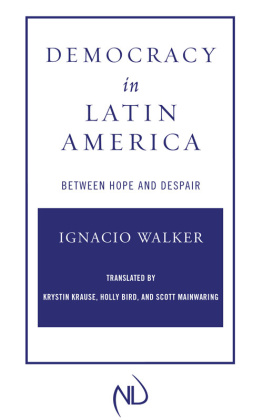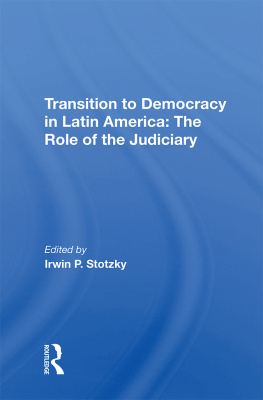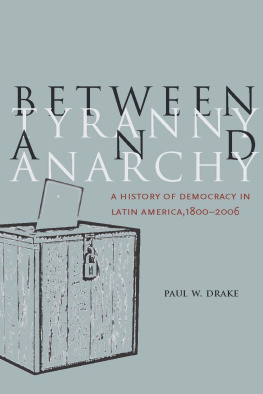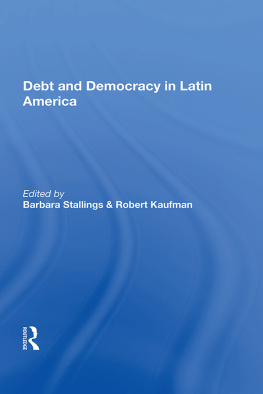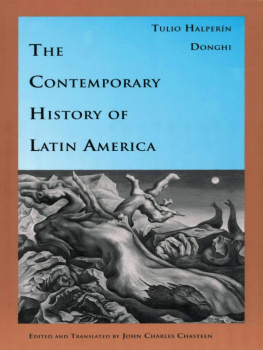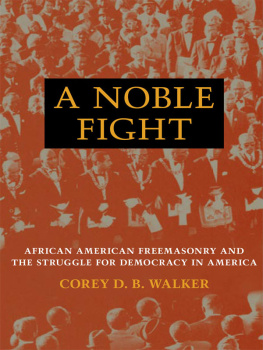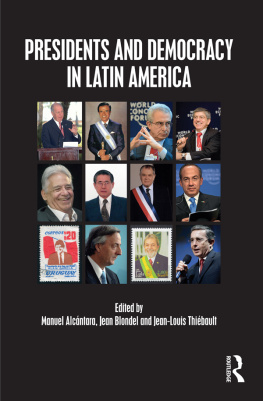RECENT TITLES FROM THE HELEN KELLOGG INSTITUTE FOR INTERNATIONAL STUDIES
Scott Mainwaring, series editor
The University of Notre Dame Press gratefully thanks the Helen Kellogg Institute for International Studies for its support in the publication of titles in this series.
Matthew R. Cleary
The Sources of Democratic Responsiveness in Mexico (2010)
Leah Anne Carroll
Violent Democratization: Social Movements, Elites, and Politics in Colombias Rural War Zones, 19842008 (2011)
Timothy J. Power and Matthew M. Taylor, eds.
Corruption and Democracy in Brazil: The Struggle for Accountability (2011)
Ana Mara Bejarano
Precarious Democracies: Understanding Regime Stability and Change in Colombia and Venezuela (2011)
Carlos Guevara Mann
Political Careers, Corruption, and Impunity: Panamas Assembly, 19842009 (2011)
Gabriela Ippolito-ODonnell
The Right to the City: Popular Contention in Contemporary Buenos Aires (2012)
Susan Fitzpatrick-Behrens
The Maryknoll Catholic Mission in Peru, 19431989: Transnational Faith and Transformation (2012)
Barry S. Levitt
Power in the Balance: Presidents, Parties, and Legislatures in Peru and Beyond (2012)
Srgio Buarque de Holanda
Roots of Brazil (2012)
Jos Murilo de Carvalho
The Formation of Souls: Imagery of the Republic in Brazil (2012)
Douglas Chalmers and Scott Mainwaring, eds.
Problems Confronting Contemporary Democracies: Essays in Honor of Alfred Stepan (2012)
Peter K. Spink, Peter M. Ward, and Robert H. Wilson, eds.
Metropolitan Governance in the Federalist Americas: Strategies for Equitable and Integrated Development (2012)
Natasha Borges Sugiyama
Diffusion of Good Government: Social Sector Reforms in Brazil (2012)
For a complete list of titles from the Helen Kellogg Institute for International Studies, see http://www.undpress.nd.edu
This book is a dialogue between academia and politics. My life has traveled paths between both. After a decade dedicated to law, first as a student and later as a human rights lawyer during the Pinochet dictatorship (19731990), my life turned to political science and active politics with a single fixation: the consolidation of democracy and respect for human rights in Chile and in Latin America.
I belong to a political generation marked by two vital dates: September 11, 1973, with the military coup that interrupted one of the oldest democracies in Latin America, and October 5, 1988, with the plebiscite that put an end to Pinochets dictatorship and opened up the way to democracy. Both processesthe breakdown and the transition to democracyinstilled in many of us the need to think deeply about the past, present, and future of democracy in the region.
In the 1980s, I dedicated myself to a systematic reflection on the processes of the breakdown of democracy and the initial processes of transition to democracy. I did this first as a graduate student at Princeton University, where I received a Ph.D. in political science, and later as part of an outstanding team at the Center for Latin American Studies (CIEPLAN) in Santiago, Chile, under the leadership of Alejandro Foxley.
In the 1990s and in the first decade of the 2000s, we put into action all that we had learned, suffered, and above all, longed for and dreamed based on certain fundamental values and academic rigor. Given the past experience of great political failure, this time we felt we could not failfor our own sake and for the tremendous expectations placed on the processes of democratization by the people of Latin America. Victims of so much deception and frustration throughout history, they maintained hope for a future of economic and social progress, where the dignity and rights of all people would be respected.
I was appointed director of political relations at the Secretariat General of the Presidency (19901994), under the leadership of Edgardo Boeninger, in the transitional government to democracy headed by Patricio Aylwin. It was like getting a second Ph.D., this time in political action, within a transition to democracy that I consider to have been successful. Subsequently, I was elected as member of the National Congress for two consecutive terms (19941998 and 19982002) coinciding with the government of President Eduardo Frei Ruiz-Tagle (19942000). From 2004 to 2006 I served as minister of foreign affairs under President Ricardo Lagos, and in 2009 I was elected senator for an eight-year term from 2010 to 2018. In 2010, I was also elected president of the Christian Democratic Party through 2012.
I emphasize my political trajectory because this book goes beyond the academic. Without forgoing the rigor and systematic analyses that stem from my academic formation, I wanted to leave space for experience itself, both personal and collective, in order to attain a fuller understanding of politics and democracy in Latin America.
The following reflections attempt to give an account of the abundant available literature about democracy in the region, especially in recent decades, organizing it in a systematic manner, but with the support of a political trajectory that follows other paths. I believe that this combination of academic perspective and real-world experience enhances the understanding of political and economic development in this part of the world.
My own life, both political and academic, and the lives of others of my generation bear witness to the dilemmas that we faced between the waves of democracy and authoritarianism in the past decades, both in Chile and throughout Latin America. It is no accident that most political leaders in Chile today are between the ages of fifty-three and fifty-seven: at the time of the 1973 military coup we were between the ages of fifteen and nineteen. The political tragedy that we lived, from the breakdown of democracies in the late 1960s and early 1970s through the transitions to democracy that began in the late 1970s, inspired in us, more than in any other generation, a determined commitment to systematic reflection.
After I completed my law degree at the University of Chile in 1978, when Pinochets dictatorship was in full swing, I had the chance to enter one of the best law firms in the country. I decided, given my beliefs and the political context in which we were living, that I could not follow the path of practicing freely as a lawyer while human rights were being violated in Chile. I became a lawyer for the Vicara de la Solidaridad (the Vicariate of Solidarity) under the determined, clear-sighted, and prophetic leadership of Cardinal Ral Silva Henrquez. It was the postVatican II Catholic Church, committed to the dignity and rights of the human person. I lost all my cases as a human rights lawyer (19791982), but I felt deeply fulfilled as a person. Above all, I came to understand that respect for human rights constitutes the moral foundation of democracy.

